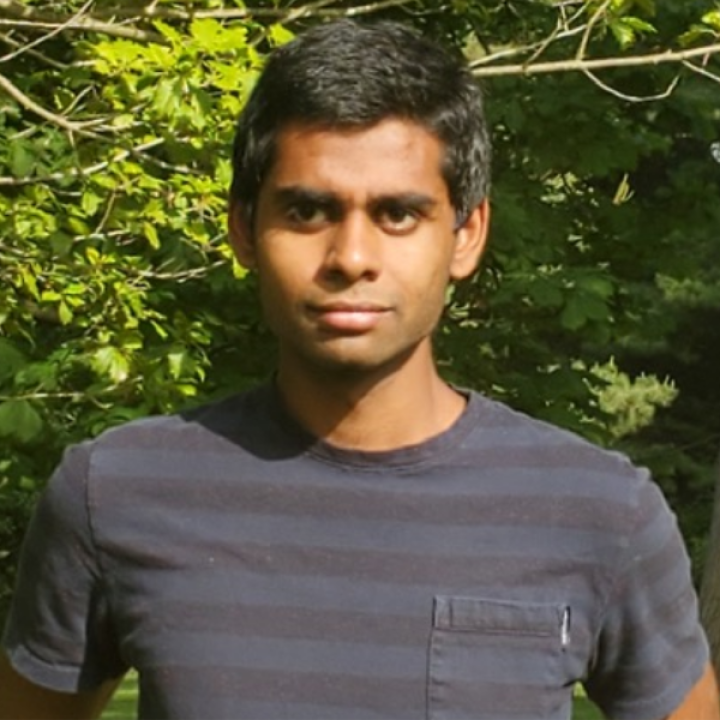Naveen Raman Wins 2022 Churchill Scholarship
This article is republished from CMNS
Raman, a computer science and mathematics double major, began working with UMD computer science faculty members in 2018. Since then, he has authored or co-authored seven conference papers on topics at the intersection of computer science, economics and social good.
The Churchill Scholarship will allow Raman to work with Jon Crowcroft, the Marconi Professor of Communications Systems in the University of Cambridge Computer Lab, on his M.Phil. in computer science. He plans to focus on the fairness of artificial intelligence (AI) and machine learning (ML) algorithms in critical fields such as criminal justice, job markets and health care. After his time in Cambridge, Raman plans to pursue a Ph.D. in computer science.
“For graduate school, I plan to study how AI and ML systems can work for social good through applications to health care and social networks,” Raman said. “AI and ML have the potential to revolutionize health care through improvements in clinical prognosis, but predicting patient outcomes and diseases is especially challenging for patients from marginalized communities due to data sparsity and bias. I plan to combat these problems by developing robust learning algorithms that work in the presence of data perturbations and minimize error rates.”
Raman began using intelligent computing to improve the utility and fairness of human systems with Distinguished University Professor of Computer Science Aravind Srinivasan and former Computer Science Assistant Professor Max Leiserson. He worked with them to develop algorithms to identify cancer mutation signatures before moving on to working with Computer Science Assistant Professor John Dickerson to develop policies that balance fairness and profit in ride-pooling systems.
He also works with Computer Science Associate Professor Jordan Boyd-Graber to improve question answering systems by leveraging data from trivia competitions. Raman’s focus is on advancing so-called named entity linking algorithms, which connect names found in a question to larger repositories of data about them like Wikipedia. These advances will ultimately help question answering systems perform better on a diverse set of questions.
In summer 2019, Raman worked to detect rudeness, toxicity and burnout in open-source communities as a participant in Carnegie Mellon University’s Research Experience for Undergraduates in Software Engineering program. Two summers ago, he worked at Facebook to develop a user interface for debugging machine learning models and learned about important societal issues that machine learning can help solve, such as hate speech detection. Last summer, he worked at MIT Lincoln Labs to improve human-artificial intelligence collaboration. This semester, he is working at the World Resources Institute as part of the Electric School Bus Initiative.
“Naveen is working at the forefront of a broad portfolio of fields—software engineering with his CMU colleagues, natural language processing with Jordan Boyd-Graber here at UMD, computer vision with his MIT Lincoln Labs colleagues, and 'EconCS' meets fairness in AI with me,” Dickerson said. “He is at the beginning of what will, without a doubt, be a storied and impactful career.”
Raman, who attended Richard Montgomery High School in Rockville, Maryland, is a member of the Advanced Cybersecurity Experience for Students in the Honors College and the Global Fellows program. He is also a Goldwater Scholar, President’s Scholar, Philip Merrill Presidential Scholar and a Computing Research Association Outstanding Undergraduate Researcher finalist. He has been awarded the Brendan Iribe Endowed Scholarship, Capital One Bank Dean’s Scholarship in Computer Science and Corporate Partners in Computing Scholarship.
An active competitor, Raman’s team won the National Academy Quiz Tournaments’ Division 2 Intercollegiate Championship Tournament during his freshman year. In 2020, he and two classmates received an honorable mention award in the 72-hour Mathematical Contest in Modeling for their project that analyzed the effect that rising global temperatures have on herring and mackerel fishing along the Scottish coast. He also received an outstanding award in the 2020 SIMIODE Challenge Using Differential Equations Modeling for his team’s work on modeling interactions in refugee camps.
He has been a teaching assistant for a programming languages class and the lead student instructor for a class on algorithms for coding interviews.
Off campus, Raman teaches math skills to underprivileged elementary school students in the Maryland Mentor Program and previously volunteered at the College Park Academy charter school helping students improve their math skills.
The Department welcomes comments, suggestions and corrections. Send email to editor [-at-] cs [dot] umd [dot] edu.
